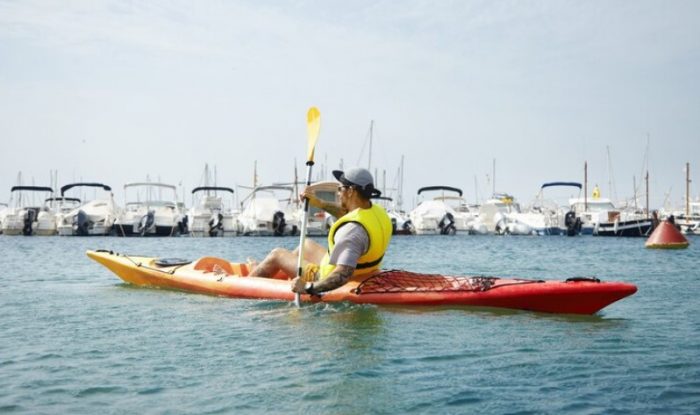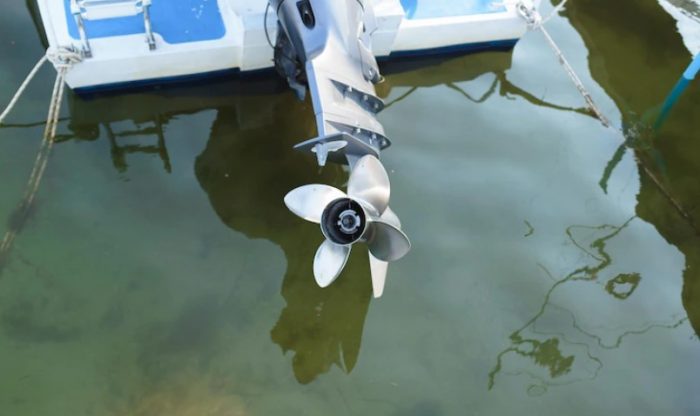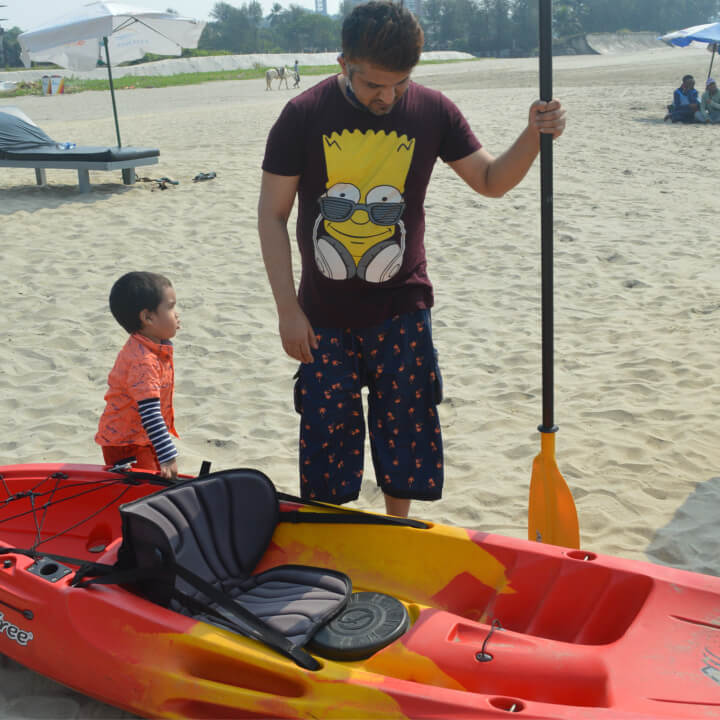The lanyard kill switch, also called the Motor kill switch, helps prevent propeller strike injuries. It is well-designed to shut the boat engine down and stop the propeller’s rotation. Stopping the propeller rotation prevents the disasters that occur during propeller striking.
Key Takeaways
- A propeller guard can prevent propeller strike injuries because it is designed to prevent people and objects from coming into contact with the propeller blades
- A propeller strike poses the greatest risk to divers, not boat operators and passengers.
- The ladder interlock sends a message by producing a warning sound that leads to turning off the motor
- The automatic sensor helps the captain to shut down the boat’s engine
Other equipment that helps in propeller safety

Apart from the engine kill switch, several other gadgets also perform very well when it comes to propeller safety. They come in handy, especially by captains, and can either work with the ignition switch or work independently. These gadgets include;
The ladder interlock
It connects the motor to the open water platform and ladder. In case of any complications, it sends a message by producing a warning sound that leads to turning off the motor. It works perfectly; however, they are higher chances of having propeller issues underwater and not on the ladder. This may take a long time to be discovered and can be very dangerous if not well observed.
The automatic sensor
It has two main functions. First, it alerts the captain when anyone is under the water’s surface. It also helps in shutting down the boat’s engine.
The propeller guard
The propeller guard secures the propeller, and any chances of the propeller getting any injuries are eliminated. Its only challenge is that it cannot be used in all vessels. It has limitations to ski boats and boats with generally high speed. However, despite its limitation, it is still a good gadget.
The propeller cover
It was not designed for motor running. It can protect the propeller, but it cannot maintain the stability of the propeller at all times.
How to prevent propeller strikes

By following a few safety practices, it will be easy for vessel operators to manage propeller accidents. By following the procedures, the prevention of accidents is not one hundred percent guaranteed, but the accidents are reduced to a great level.
- The vessel operator needs to turn off the engine when the passengers are boarding or alighting from the vessel. This may seem less important, but it plays a huge role. When boarding or departing from a boat, the passenger is in a vulnerable state; at this stage, the chances of an accident occurring are huge. Turning the engines prevents the propellers from spinning, which secures the passengers.
- As the vessel operator, you are to safeguard both the vessel and the passengers. It is therefore essential that you prevent the accidental throwing of passengers overboard. How?
- You should never start the vessel’s engine with the engine in gear. This is the worst mistake you could ever make. This will make the passengers unaware and may lead to accidents.
- Never ride in dangerous spots on the vessel. These areas include; the back seat, the gunwale, the transom, or the bow. Despite having experience for an extended period, a slight error can lead to many lives being lost in a speck of an eye.
- The passengers are free to do as they wish on the boat as long as they do not risk their lives and those of others. It is essential to remind the passengers of their expectations repeatedly. For example, it is compulsory for the captain or vessel operator to always alert or signal the passengers of departure. This may be an everyday thing but plays a massive role in protecting passengers from accidents such as falling overboard.
- Children are the most vulnerable category of passengers, followed by the aged. Therefore, it is necessary to assign an adult whose only task is to watch the children. They can also be signed with the responsibility of raising the alarm if any child accidentally falls overboard. Unlike adults, when children fall overboard, their survival chances are minimal. Since prevention is better than cure, watching over children sounds better.
- As the vessel operator, you have the obligation of maintaining a good lookout for the passengers when they are on the water. Over the years, research has shown that the leading causes of propeller strikes or accidents are carelessness and operator inattention. Failure to confirm specific activities may lead to dangerous accidents and incidents.
- It would be best if you slowed down when approaching areas that are congested or near anchorages. In crowded areas, it is logical that there may be swimmers or deep-sea divers who may accidentally cause damage to the propellers, which cannot be easily spotted but lead to accidents.
There may be those underwater in areas with anchorages that cannot be spotted. These are the significant causes of propeller damage.
- As a captain or vessel operator, you should be well equipped with the knowledge of indicators in the sea. You are well conversant with hazardous and therefore bound areas through these indicators. Some areas have also been marked as swimming zones. Proper following and understanding of these indicators are therefore of great significance.
Devices that reduce propeller strikes
With advancements in technology, more and more devices are being made to stop or reduce propellers or accidents. Here, we will discuss those devices that do not prevent but are known to minimize propeller strikes. They include;
- Guards
These devices provide a barrier around the propeller. With the barrier, unnecessary interruptions on the propeller are reduced. Such devices include; full cages, ring guards, and ring props
- Propulsions
These are substitutes for propellers. In simpler terms, they work in place of propellers. They work in the same way as jet drives and pump jets. When they are used, there is no need to use propellers.
- Interlocks
These devices can automatically conduct the turning off of the engine and also sound an alarm in case of an emergency. A relevant example is the ladder Interlock, which can stop the engine without any human intervention. It can also trigger the alarm in cases where passengers use the ladder for the wrong purpose: to enter or leave the water.
- Sensors
When worn by boaters, these are wireless gadgets that can quickly shut the engine off and raise or trigger the alarm in instances where a person or passenger falls overboard.
The death circle
As shocking as the name sounds, it is true. Each year, boat operators, captains, and vessel operators may accidentally let the steering wheel or the outboard steering handle as the boat or vessel is still moving. The primary phenomenon in ships and vessels is the Steering torque force then starts its task. It leads the motor to slam to the left side, leading to a reaction force that will cause the vessel to swerve towards the right. They operate as action and reaction forces. When this occurs, the victim is thrown into the water.
That is not the end. The vessel moves in circles and, unfortunately, goes back and strikes the victim in the water. The victim is subjected to severe propeller wounds, hence the Circle of death.
It is still very hard to explain why such incidents occur. Despite awareness programs among vessel operators, these incidents keep being recorded.
The vessel operators are advised never to let go of the wheel unless the boat has stopped moving to avoid such instances.
It is also advised that all seats should be tightly embarked and have safety belts to hold back the passengers and crew in such incidents.
Final Word
Matters relating to the sea can be complex if suitable precautions are not observed. Lives may also be at stake. Despite awareness programs by Marine organizations, there are still incidents and accidents recorded each day, some of which are not even reported since they are seen as minor ones. With the observation of rules and regulations which govern navigation to the best ability, it will be scarce for such cases to be recorded or even heard. However, accidents will still be reported with the continuous breaking of rules, deaths will still be there, and several casualties will be recorded. To have a better and safer journey on water bodies, the vessel operators, crew, and passengers should do as expected. If one party does its part and the other follows suit, all will be well. No progress will be made if one party performs as expected but the other party fails to do so. Marine organizations should also take the responsibility to punish those breaking the laws so that they act as an example.
References:
- https://www.quora.com/What-piece-of-equipment-on-a-boat-is-most-important-in-preventing-propeller-strike-injuries
- https://boatingscout.com/equipment-preventing-propeller-strike-injuries
- https://www.ridetheducksofseattle.com/what-piece-of-equipment-is-most-important-in-preventing-propeller-strike-injuries/

Rockey is a kayaking enthusiast who has been kayaking with a local group for the last five years. He loves using kayaks while out on outings on the water or camping when the friends want to have a BBQ party somewhere on the bank of a local lake. More About James R Rockey at About Page Here: Authors
Based on his experiences with the different types of kayaks, he is sharing his opinion about kayaking tricks and required gears so that a beginner can get started right away.
Find his team on Twitter here. Happy reading!
